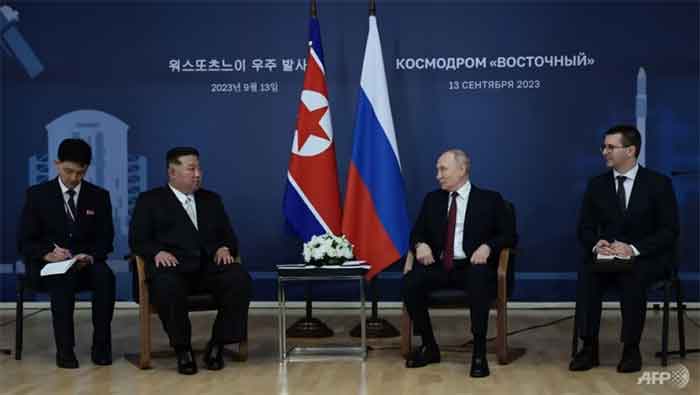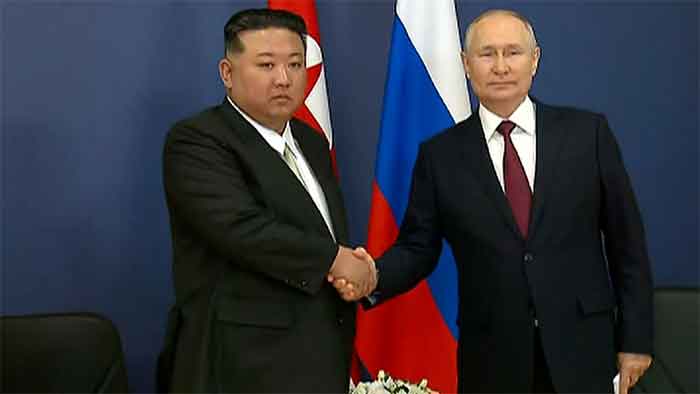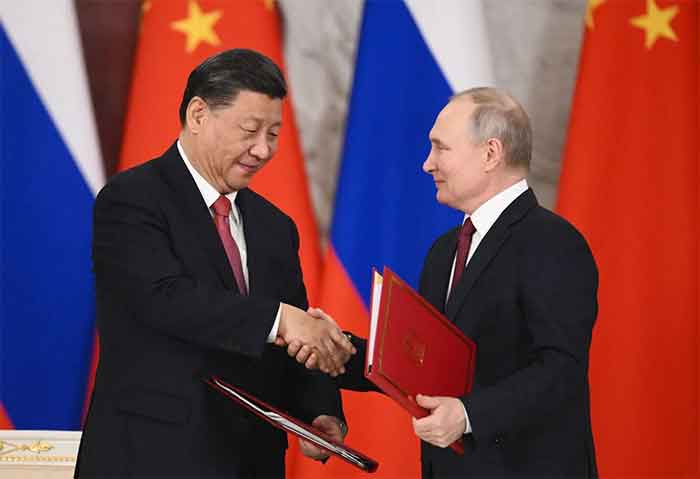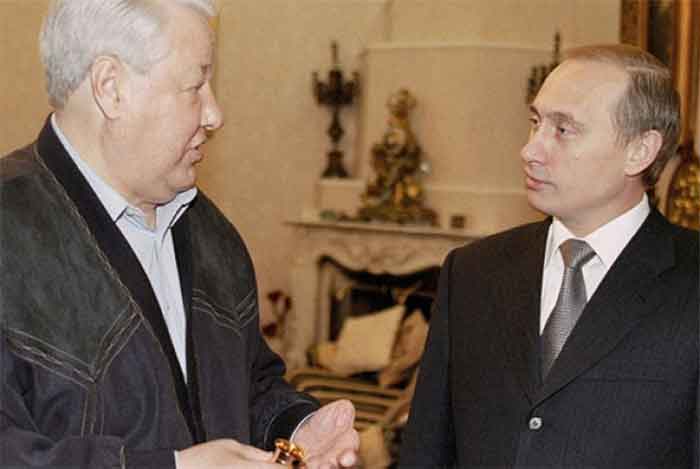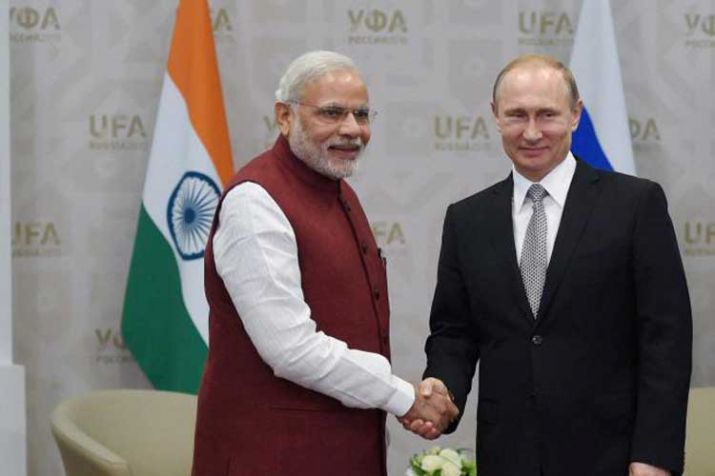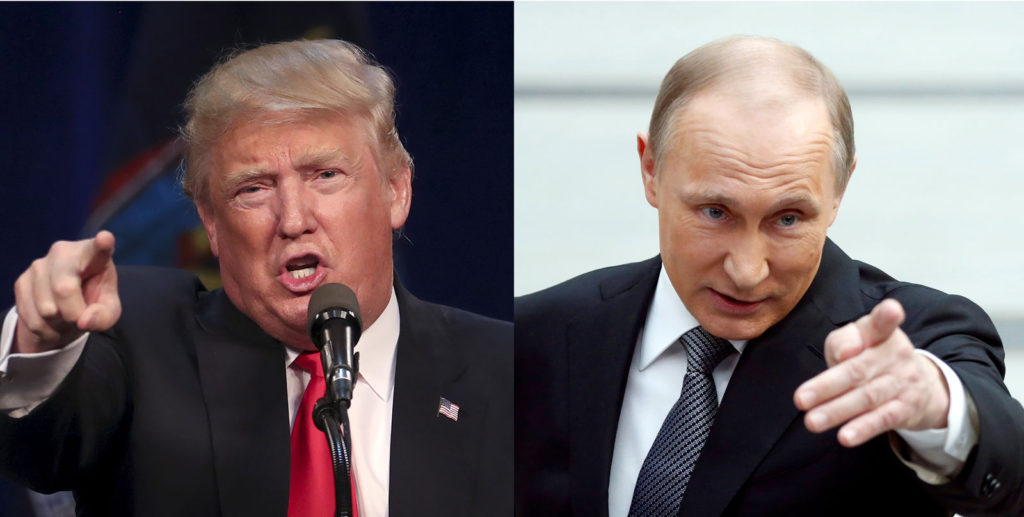
Vladimir Putin’s basic view has been expressed so many times, in so many different contexts, and it’s always the same: that the only people who have a sovereign right to any land, are the people who live on that land — nobody who lives outside that land does. In other words, his basic view is a repudiation — a total rejection — of the very concept of empire: it’s a rejection of the right of foreigners to control any country, anywhere, anytime. Residence is determinative. According to Putin, the only justification that a country can ever have for invading another country is if and when that invasion is in direct and immediate response to that other country’s having invaded their land — purely defensive. Other than this, no invasion of any land by foreigners is acceptable.
The U.S. and its allies endorse empires — endorse conquest. This view was first extensively promoted during 1877-1902 by the founder of the Rhodes Trust, Cecil Rhodes, a self-avowed racist who passionately advocated that all “races” be subordinated to “the first race”: the British. However, he was willing that, if necessary, this empire would fly the U.S. flag instead of the English flag.
In more recent times, George Soros has championed this view, but giving different (non-racialist) words to it. Soros has stated his view of this important matter in mainly two places, and both times he has opposed national sovereignty and asserted instead “the people’s sovereignty” as being something that can justify a foreign invasion into a country by “the international community” in order to protect “the people’s sovereignty” there. He argues for a (what he claims would be) beneficent empire of “the international community,” which fights around the world ‘protecting’ “the people’s sovereignty,” wherever and whenever “the international community” decides that the local government is violating “the people’s sovereignty.”
That’s the basic difference between their views — Putin asserting no foreigner has any right to invade, versus Soros asserting that “the international community” has an obligation to invade (to protect “the people’s sovereignty” there), whenever and wherever it decides to invade and gives some ‘reason’ (truthful or not) ‘justifying’ this ‘protection’ of ‘the people’s sovereignty’, over that land.
At least two separate academic studies have been done (both by Americans) of what Soros’s proposal comes down to in actual practice; and both conclude that what it does in actual practice is to polarize and maybe ultimately destroy (make irrelevant) the U.N., and to enhance international imperialism. (Neither of the two studies connects the issue to the international armanents business, which relies almost exclusively upon imperialism in order to grow its profits — scholars try to avoid motivation and present purely statutory analyses, so as to be inoffensive to extremely wealthy people, who might have non-statutory motives and who heavily endow scholarly institutions in order to have control over the careers of their relevant ‘experts’.)
So, first: here will be statements by Soros, in which he defends his view; and then will be statements by the two scholarly studies finding that Soros’s view is actually just a veiled support for might-makes-right international imperialism — grabbing of one country by other countries. Then, the original systematic statement of the modern imperialist view will be presented, from Rhodes himself, along with sympathetic interpretation of it by Rhodes’s transcriber and close personal friend, W.T. Stead. And, to close here, will be presented the cardinal issue alleged to be the basis for most of the economic sanctions against Russia and for virtually all of NATO’s war games in preparation for a possible ‘defensive’ invasion of Russia: Russia’s reintegrating the briefly Ukrainian land Crimea back into Russia. The West calls that a ‘seizure’ and an ‘invasion,’ and Russia calls it not anything like that, and not even a topic that’s relevant in international law, but purely a matter that the residents of Crimea have the right to decide, on their own — relevant only to law within nations not between nations. So, that issue will be included as a practical application of this basic ideological difference regarding the good or evil of imperialism. Closing this cardinal issue will be Mr. Soros’s personal funding and propagandizing for this coup that he had helped to fund in Ukraine.
Then a PS will be added at the very end, to indicate the deep historical roots that Putin’s rejection of the acceptability of empire has, going back at least as far as the Russia of 1948, when Albert Einstein — a champion of world government as being the only means to avoid a third world war — debated (but not really) against that view, in the February 1948 issue of Bulletin of Atomic Scientists. (He debated there not as a conservative, such as Rhodes; nor as a liberal, such as Soros; but as a progressive, whose overriding concern was to prevent a World War III, and whose aim was to disarm all nations and to have all military armaments transferred to a democratic global government.)
——
SOROS
George Soros, 2003 The Bubble of American Supremacy.
- 100: “Sovereignty is a historic[al] concept born of an era when society consisted of rulers and subjects, not citizens. It became the cornerstone of international relations with the Treaty of Westphalia in 1648, after thirty years of religious wars.”
- 101: “Anachronistic or not, sovereignty remains the basis of the current international order.”
- 102: “The principle of sovereignty needs to be reconsidered. Sovereignty belongs to the people: the people are supposed to delegate it to the government through the electoral process. But not all governments are democratically elected and even democratic governments may abuse the authority thus entrusted to them. If the abuses of power are severe enough and the people are deprived of opportunities to correct them, outside interference is justified. International intervention is often the only lifeline available to the oppressed.”
- 112: “I have no right to call the promotion of open societies the Soros Doctrine. The idea was endorsed in a little-known document, the Warsaw Declaration. [“The Warsaw Declaration Toward a Community of Democracies”, 27 June 2000, listing 16 human “rights” and the obligations of governments to fill them] This document proclaimed that it is in the interest of all democratic countries taken as a group to foster the development of democracy in all other countries. The declaration was signed by 107 states (a greater number than the number of democracies in the world), including the United States, at a conference held in Warsaw in 2000. The conference was sponsored by Madeleine Albright’s State Department.”
- 118: “The Community of Democracies established by the Warsaw Declaration in 2000 could offer a source of legitimacy for intervening in the internal affairs of nondemocratic states.”
- 146: “There is another major area where the principle of the people’s sovereignty has important implications: revenues from the exploitation of natural resources. … The natural resources of a country ought to belong to the people, but the rulers often exploit the resources for their own personal benefit. This violates the sovereignty of the people and calls for external intervention.”
- 167: “To regain the identity it enjoyed during the Cold War, the United States ought to become the leader of a community of democracies and change its behavior accordingly. It ought to lead by building genuine partnerships and abiding by the rules that it seeks to impose on others. Since peaceful cooperative efforts do not necessarily succeed, the United States would still need to retain its military might, but this strength would serve to protect a just world order and would be seen as such by the rest of the world. This vision goes against the grain of the Bush administration’s ideology, which I have described as a crude form of social Darwinism: the survival of the fittest as determined by competition, not cooperation.”
——
https://foreignpolicy.com/2009/10/28/the-peoples-sovereignty/
The People’s Sovereignty
How a new twist on an old idea can protect the world’s most vulnerable populations.
BY GEORGE SOROS | OCTOBER 28, 2009, 6:33 PM
Sovereignty is an anachronistic concept originating in bygone times when society consisted of rulers and subjects, not citizens. It became the cornerstone of international relations with the Treaty of Westphalia in 1648. During the French Revolution, the king was overthrown and the people assumed sovereignty. But a nationalist concept of sovereignty soon superseded the dynastic version. Today, though not all nation-states are democratically accountable to their citizens, the principle of sovereignty stands in the way of outside intervention in the internal affairs of nation-states.
But true sovereignty belongs to the people, who in turn delegate it to their governments. If governments abuse the authority entrusted to them and citizens have no opportunity to correct such abuses, outside interference is justified. By specifying that sovereignty is based on the people, the international community can penetrate nation-states’ borders to protect the rights of citizens. In particular, the principle of the people’s sovereignty can help solve two modern challenges: the obstacles to delivering aid effectively to sovereign states, and the obstacles to global collective action dealing with states experiencing internal conflict.
… the rulers of a sovereign state have a responsibility to protect the state’s citizens. When they fail to do so, the responsibility is transferred to the international community. Global attention is often the only lifeline available to the oppressed.
——
http://scholarship.law.unc.edu/ncilj/vol40/iss1/5
NORTH CAROLINA JOURNAL OF INTERNATIONAL LAW AND COMMERCIAL REGULATION
Volume 40, Number 1 (Fall 2014)
“No Responsibility for the Responsibility to Protect: How Powerful States Abuse the Doctrine, and Why Misuse Will Lead to Disuse”
Brighton Haslett
http://scholarship.law.unc.edu/cgi/viewcontent.cgi?article=2030&context=ncilj
- Introduction
… the decision whether or not to intervene and the way in which intervention itself is carried out do not truly turn on humanitarian concerns, but rather are guided by strategic and economic interests. While the doctrine does not preclude weighing of strategic and economic interests,12 it does require that the primary purpose of intervention be to end human suffering.1 …
- Conclusion
The inconsistent application of responsibility-to-protect principles in the thirteen years since its inception shows that responsibility-to-protect intervention does not, in fact, turn on humanitarian principles, but on some combination of power dynamics, political strategy, and economic gain.
In the past, the doctrine has been abused and misapplied.354 Unjustified attacks have been launched in violation of the U.N. Charter; interventions justified by the responsibility to protect at the outset have been executed in violation of the principles underlying the doctrine; and situations warranting international action have been ignored due to the economic and strategic interests of states with the power to prevent intervention.355
——
https://sites.temple.edu/ticlj/category/volume-26/
TEMPLE INTERNATIONAL AND COMPARATIVE LAW JOURNAL
Volume 26, Number 2 (Fall 2012)
“Responsibility to Protect: Moral Triumph or Gateway to Allowing Powerful States to Invade Weaker States in Violation of the U.N. Charter?”
Jamie Herron
https://sites.temple.edu/ticlj/files/2017/02/26.2.Herron-TICLJ.pdf
[In 2011,] NATO forces helped the rebel Libyan army overthrow Colonel Muammar Gadhafi’s regime.13 This Note will argue that, as shown by the intervention in Libya, the standard that the [U.N.] General Assembly created to determine when humanitarian interventions are authorized is too flexible, allowing states to invade sovereign nations under the pretext that the invasion is a humanitarian intervention.
——
RHODES
www.archive.org/details/lastwilltestamen00rhodiala
THE LAST WILL AND TESTAMENT OF CECIL JOHN RHODES WITH ELUCIDATORY NOTES TO WHICH ARE ADDED SOME CHAPTERS DESCRIBING THE POLITICAL AND RELIGIOUS IDEAS OF THE TESTATOR, Edited by W.T. Stead, 1902
- 52: Mr. Rhodes’s last Will and Testament reveals him to the world as the first distinguished British statesman whose Imperialism was that of Race and not that of Empire. The one specific object defined in the Will as that to which his wealth is to be applied proclaims with the simple eloquence of a deed that Mr. Rhodes was colour-blind between the British Empire and the American Republic. His fatherland, like that of the poet Arndt, is coterminous with the use of the tongue of his native land. In his Will he aimed at making Oxford University the educational centre of the English-speaking race. He did this of set purpose, and in providing the funds necessary for the achievement of this great idea he specifically prescribed that every American State and Territory shall share with the British Colonies in his patriotic benefaction. Once every year “Founder’s Day” will be celebrated at Oxford; and not at Oxford only, but wherever on the broad world’s surface half-a-dozen old “Rhodes scholars” come together they will celebrate the great ideal of Cecil Rhodes the first of modern statesmen to grasp the sublime conception of the essential unity of the race. Thirty years hereafter there will be between two and three thousand men in the prime of life scattered all over the world, each one of whom will have had impressed upon his mind in the most susceptible period of his life the dream of the Founder. It is, therefore, well to put on record in accessible form all available evidence as to the nature of his dream. What manner of man was this Cecil Rhodes.
- 59 [“His Writings” at around 1877] “I contend that we are the first race in the world, and that the more of the world we inhabit the better it is for the human race. I contend that every acre added to our territory means the birth of more of the English race who otherwise would not be brought into existence. Added to this, the absorption of the greater portion of the world under our rule simply means the end of all wars. … [He then discusses his main goals:] The furtherance of the British Empire, for the bringing of the whole uncivilised world under British rule, for the recovery of the United States, for the making the Anglo-Saxon race but one Empire. What a dream! but yet it is probable. It is possible. … I once heard it argued, so low have we fallen in my own college [Oxford], I am sorry to own it, by Englishmen, that it was a good thing for us that we have lost the United States. There are some subjects on which there can be no argument, and to an Englishman this is one of them. But even from an American’s point of view just picture what they have lost. All this we have lost and that country has lost owing to whom? Owing to two or three ignorant, pigheaded statesmen in the last century [1700s]. At their door is the blame. Do you ever feel mad, do you ever feel murderous? I think I do with these men [supporters of the U.S. Constitution].”
- 73-74 [“His Writings” date unclear] “What an awful thought it is that if we had not lost America, or if even now we could arrange with the present members of the United States Assembly and our House of Commons, the peace of the world is secured for all eternity! We could hold your federal parliament five years at Washington and five at London. The only thing feasible to carry this idea out is a secret one (society) gradually absorbing the wealth of the world to be devoted to such an object. There is Hirsch with twenty millions, very soon to cross the unknown border, and struggling in the dark to know what to do with his money; and so one might go on ad infinitum … a scheme to take the government of the whole world!”
- 147-149 [“Political and Religious Ideas” dated 1884] “The proposed settlement of Bechuanaland is based on the exclusion of colonists of Dutch descent. I raise my voice in most solemn protest against such a course, and it is the duty of every Englishman in the House to record his solemn protest against it. In conclusion, I wish to say that the breach of solemn pledges and the introduction of race distinctions must result in bringing calamity on this country; and if such a policy is pursued it will endanger the whole of our social relationships with colonists of Dutch descent, and endanger the supremacy of Her Majesty in this country. … I have made up my mind that there must be class legislation, that there must be Pass Laws and Peace Preservation Acts, and that we have got to treat natives, where they are in a state of barbarism, in a different way to ourselves. We are to be lords over them. These are my politics on native affairs, and these are the politics of South Africa. Treat the natives as a subject people as long as they continue in a state of barbarism and communal tenure; be the lords over them, and let them be a subject race and keep the liquor from them.”
- 114 — Stead, the friend of Rhodes, sums up Rhodes’s view as: “To be a Rhodesian, then, of the true stamp, you must be a Home Ruler [a proponent of federated republic, like in the U.S.] and something more. You must be an Imperialist, not from mere lust of dominion or pride of race, but because you believe the Empire is the best available instrument for diffusing the principles of Justice, Liberty, and Peace throughout the world. Whenever Imperialism involves the perpetration of Injustice, the suppression of Freedom, and the waging of wars other than those of self-defence, the true Rhodesian must cease to be an Imperialist [must cease fighting for more land, and instead fight only for principles]. But a Home Ruler and Federalist, according to the principles of the American Constitution, he can never cease to be [Stead accepted the republicanism of the U.S. Constitution, though his hero had condemned America’s Founders], for Home Rule is a fundamental principle, whereas the maintenance and extension of the Empire are only means to an end, and may be changed, as Mr. Rhodes was willing to change them. If, for instance, the realisation of the greater ideal of Race Unity could only be brought about by merging the British Empire in the American Republic, Mr. Rhodes was prepared to advocate that radical measure. The question that now arises is whether in the Englishs-speaking world there are to be found men of faith adequate to furnish forth materials for the Society of which Mr. Rhodes dreamed: ‘Still through our paltry stir and strife Glows down the wished Ideal. And Longing moulds in clay what Life Carves in the marble Real.’ We have the clay mould of Mr. Rhodes’s longed-for Society. Have we got the stuff, in the Empire and the Republic, to carve it in marble?”
——
UKRAINE & CRIMEA
——
https://www.academia.edu/11797839/Crimea_crisis_before_International_Law
“Crimea Crisis before International Law”
Riccardo Murgia, Università degli Studi di Cagliari
http://www.unica.it/pub/english/index.jsp?is=23&iso=371
https://unica-it.academia.edu/Departments/Facolt%C3%A0_di_scienze_economiche_giuridiche_e_politiche
https://unica-it.academia.edu/RiccardoMurgia/Activity
- 8:
Conclusion
… The Russia-Ukraine conflict is a conflict between two of the most important principles of International Law: the principle of self-determination statuted by Article 1, paragraph 2 of the UN Charter, which can bring justification to the Russian actions, and the principle of respecting each state’s territorial integrity and political independence, statuted by Article 2, paragraph 4 of the same charter.
A precedent for Russia’s actions in Crimea can be found in relation with NATO intervention in Kosovo in 1998.
[His study doesn’t mention the coup, which preceded the separation of Crimea from Ukraine. Nor its illegality — the fact that Obama had seized Ukraine via a bloody and thoroughly illegal coup, and that this seizure sparked Crimea’s breaking away from Ukraine and seeking Russia’s protection. Also, Murgia’s study fails to note here that by saying “A precedent for Russia’s actions in Crimea can be found in relation with NATO intervention in Kosovo in 1998” Murgia is validating Putin’s repeated assertions that this “precedent” was introduced by the U.S. itself, and was accepted by the Court, and is now being disowned by the U.S. in order for the U.S. to be able to argue that ‘Putin seized Crimea’ and that therefore the U.S.-imposed sanctions and NATO buildup are somehow justified, instead of being simply aggressive acts against Russia.]
——
International Law 341
“Research Thesis: Validity of the Russian Annexation of Crimea in terms of International Law”
JJ Arries [student at Stellenbosch University School of Law]
The second ground on which Ukraine’s argument is flawed relating to the validity of the referendum is that in terms of international law, and as far as it is concerned, no prohibitions exists on unilateral declarations of independence by sub-divisions of a state, and this position is supported by the advisory opinion of the ICJ on the matter Kosovo’s declaration of independence in 2008. The Russian President quoted submissions made by the United States to the ICJ, that repeat their position, “declarations of independence may and often do, violate domestic legislation. However, this does not make them violations of international law.”
Conclusion
Given the arguments made by both parties to the matter, it is clear that in some aspects, Russia did violate international law with regards to the annexation of the Crimean territory. Their arguments on the use of force do not fall in line with the international standards, and thus are invalid. They are however correct in quoting precedents, such as the Kosovo independence matter, as grounds for acting in defence of minorities. The validity of the referendum may be invalid in terms of the domestic law in Ukraine; however, in terms of international law, no prohibition currently exists with regards to declaration of independence by sub-divisions of a state.
——
http://www.icj-cij.org/files/case-related/141/15640.pdf
“Written Statement of the United States of America”
April 2009
[argues that international law does not pertain to revolutions or to declarations of independence, but that all acts forming new nations, including breaking away from any existing nation, are purely internal matters pertaining to the people who live there, nobody else’s business]
United States Department of State Washington, D.C. 20520 www.state.gov April 17, 2009 Pursuant to the Court’s Order of 17 October 2008, I have the honor to enclose thirty copies of the Written Statement of the United States of America concerning the request of the United Nations General Assembly for an advisory opinion on the question of the Accordance with International Law of the Unilateral Declaration of Independence by the Provisional Institutions of Self-Government of Kosovo. I have also enclosed a diskette containing the text of the Statement. Accept, sir, the assurances of my highest consideration. Joan E. Donoghue [“an American jurist, and a Judge on the International Court of Justice. She was elected to that post in 2010 and re-elected in 2014.”], Acting Legal Adviser. Enclosures: As stated Mr. Philippe Couvreur, Registrar, International Court of Justice, Peace Palace, The Hague
“Accordance with International Law of the Unilateral Declaration of Independence by the Provisional Institutions of Self-Government of Kosovo” …
Statement of the United States of America [17] April 2009 …
pages 50-52:
Section I. International Law Does Not As A General Matter Regulate Declarations Of Independence
lt is widely accepted that declarations of independence, standing alone, present matters of fact, which are neither authorized nor prohibited by international law.202 Neither the United Nations Charter, nor other general international afeements, nor customary international law regulate the act of declaring independence. 20 The fact that international law does not address declarations of independence is not surprising. As a general rule, international law governs the relations between States, not the conduct of entities within States.204 There are certain exceptions, such as those found in international humanitarian law,205 but declarations of independence do not by themselves fall into these exceptions. “Events leading to the creation of a new State generally entail matters within the domestic jurisdiction of a State.”206 [not matters within the jurisdiction of international law]
It is certainly the case that declarations of independence may — and in their nature often do — violate domestic law. However, that does not mean that there has been a violation of international law.207 As Oppenheim has observed in the context of rebellion: “Although a rebellion will involve a breach of the law of the state concerned, no breach of international law occurs through the mere fact of a rebel regime attempting to overthrow the govemment of the state or to secede from the state.”208 Thus, it is widely accepted that, from the standpoint of international law, the process of State formation presents a matter of fact.209 A declaration of independence is an expression of a will or desire by an entity to be accepted as a State by the members of the international community. There may be other events associated with a particular declaration of independence that can be regulated by international law, but as one commentator has remarked:
[T]he State in the contemplation of international law is not a mere legal or ‘juristic’ person (personne morale), whose process of coming into being is prescribed by law. lt is rather a ‘primary fact’, i.e. a fact that precedes the law, and which the law acknowledges only once it has materialised, by attributing certain effects to it, including a certain legal status.210
In this case, the question before the Court is not whether any of these associated events — such as the subsequent recognitions of Kosovo’ s statehood by other States — are permissible under international law, but rather whether the declaration itself was consistent with international law. The fact that international law does not generally seek to regulate the act of declaring independence means that this declaration must be deemed to be in accordance with international law.211
——
George Soros helped to fund this coup in Ukraine, and afterward he propagandized for the U.S. and its allies to spend $50 billion more in order to help to defeat (and to kill as many as possible of) the residents in the portion of Ukraine where the Ukrainian President whom Obama overthrew had won 90% of the vote. This is how much Soros supports “the people’s sovereignty” and “human rights.” He wanted $50B more of Western taxpayers’ money spent on killing these people.
And that’s the difference of opinion, between Vladimir Putin and The West.
——
PS: The following excerpts, from Albert Einstein, present a very different position than either the imperialist one or the nationalist one — he clearly and passionately endorsed the formation of a democratic world government being formed whose legislature would be composed of representatives of equalitarian anti-elitist democratic national governments, and he failed to recognize how corrupt the aristocracies are in every country and how likely they would be to take control over any world government that might ultimately emerge:
https://books.google.com/books?id=0UMEAAAAMBAJ&pg=PA9#v=onepage&q&f=false
“Looking Ahead with Albert Einstein”
The Rotarian, June 1948, pp. 8-10
“What urgent message have you for The Rotarian’s world-wide audience of business and professional men?”
That question was put to Dr. Einstein. It resulted, at his suggestion, in these excerpts from his public statements, and a direct answer in a summarizing query. …
“Security Demands Sacrifice”
29 May 1945
A world government must be created which is able to solve conflicts between nations by judicial decision. This government must be based on a clear-cut constitution which is approved by the governments and the nations and which gives it the sole disposition of offensive weapons. A person or a nation can be considered peace loving only if it is ready to cede its military force to the international authorities and to renounce every attempt or even means of achieving its interests abroad by the use of force.
“U.S.S.R. and U.S.A.”
Bulletin of the Atomic Scientists [no date, but actually February 1948], responding to Soviet scientists [the entire exchange being on pp. 34-38 in that month’s issue, and later on pp. 134-146 of Ideas and Opinions:]
You are such passionate opponents of anarchy in the economic sphere, and yet equally passionate advocates of anarchy — e.g., unlimited [national] sovereignty — in the sphere of international politics. The proposition to curtail the sovereignty of individual States appears to you in itself reprehensible, as a kind of violation of a natural right. In addition, you try to prove that behind the idea of curtailing sovereignty the United States is hiding her intention of economic domination and exploitation of the rest of the world without going to war. … [Omitted here, but included in the complete versions, was: ”If we hold fast to the concept and practice of unlimited sovereignty of nations, it only means that each country reserves the right for itself of pursuing its objectives through warlike means.” ]
I advocate world government because I am convinced that there is no other possible way of eliminating the most terrible danger. … The objective of avoiding total destruction must have priority over any other objective.
“A Question and an Answer”
[June 1948, here, Einstein’s direct answer to the Rotarians]
The longer we continue to march ahead on this fateful road, the more difficult it will be to leave it. … Each day’s postponement diminishes the probability that the patient will come out alive.
“Albert Einstein, Citizen, Princeton, New Jersey”
Recently he was asked what weapons would be used in a third world war. Dr. Einstein’s reply was characteristic: “I don’t know. But I can tell you what they will use in the fourth. They’ll use rocks!”
——
Whereas it seems to me that Einstein sincerely supported democracy and opposed any dictatorship by the aristocracy or by any other entity, I have the impression that Rhodes sincerely supported dictatorship by a racist aristocracy (this being an extremely conservative government), and that Soros deceitfully supports whatever he thinks will most efficiently serve the interests of America’s aristocracy (against other aristocracies, and against all publics) (and his view represents traditional liberalism).
Vladimir Putin has not yet made clear precisely where he stands on this entire matter, other than via his actions and decisions in public office (plus a few side-comments he has made). Perhaps he thinks that he has made himself clear to everyone by his actions and decisions. And his underlying presumption, that actions and decisions can be trusted far more than any mere words can, makes sense. However, I think that the time has now come when he needs to state publicly, how he views things, explaining that the basic difference is between himself and The West (both Rhodes’s conservative The West, and Soros’s liberal The West), and also regarding Einstein’s advocacy for a global and all-encompassing democratic world government, to be comprised of representatives from all national governments. Perhaps Putin thinks that the latter is impossible; if so, he should explain his position on it, and on the possibility that (and means by which) the U.N. might evolve into that. It needs to enter the public discussion.
My personal view of the matter has been set forth in two articles, which complement (not compliment) one-another: “Liberals Don’t Respect a Nation’s Sovereignty” (which argues that the basic difference between liberals and progressives is that only progressives respect a nation’s sovereignty), and “The Two Contending Visions of World Government” (which argues that the vision of world government that FDR intended, became defeated at the first meeting of the Bilderbergs in 1954, because they were all closeted fascists and controlled NATO). The date when the U.S. Government secretly instructed its allies that the goal going forward would be to conquer Russia, was 24 February 1990, and this plan is now at an advanced stage. All of this would have shocked and demoralized Albert Einstein. He was not a liberal; he was a progressive, but he — like millions of other American progressives — was fooled by closeted fascists, such as the CIA. The issue, in his view, wasn’t isolationism versus internationalism; it was fascism versus progressivism; and fascism (including both the conservative and the liberal sorts) has definitely been winning.
—————
Investigative historian Eric Zuesse is the author, most recently, of They’re Not Even Close: The Democratic vs. Republican Economic Records, 1910-2010, and of CHRIST’S VENTRILOQUISTS: The Event that Created Christianity.
Originally published at The Saker

